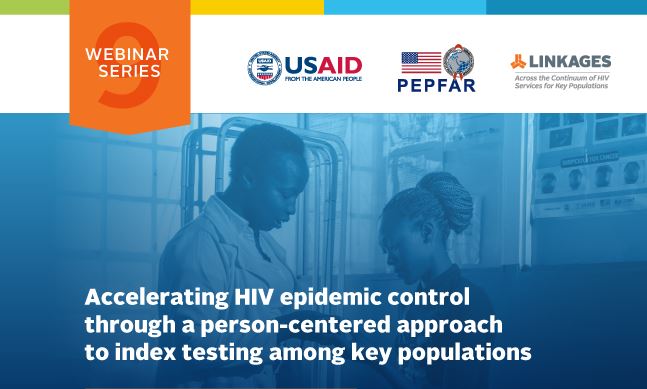Event Date
Webinar hosted by the LINKAGES project as part of the Key Populations: Evidence in action series.
To access the audio recording of the webinar, please click here.

On April 25th, the USAID– and PEPFAR-supported LINKAGES project hosted the ninth webinar in a webinar series entitled Key Populations: Evidence in Action. This webinar explored the promise and potential pitfalls of an increased focus on index testing among key populations to achieve epidemic control. Presenters discussed the rationale and guiding principles for integrating index testing into key population-focused HIV programs, as well as policy-level facilitators and barriers to widespread implementation of index testing. Presenters also shared data-driven case examples from the field of promising approaches for ethically and effectively implementing index testing with key populations.
Michael Cassell, FHI 360/LINKAGES Vietnam
Could treat-and-test be the key to optimizing the HIV epidemic control benefits of test-and treat?
Endale Workalemahu, USAID MULU/Population Services International Ethiopia
Driving up HIV case finding through index case testing among female sex workers and high-risk men
Deusdedit Mjungu, Sauti Project/Jhpiego Tanzania
Index testing with key and vulnerable populations: Sauti’s journey towards fidelity and data quality
This webinar series is intended to be a platform for (1) sharing state-of-the-art knowledge, emerging evidence, and promising practices for achieving greater impact on the HIV epidemic through programs for key populations; (2) addressing pressing questions and controversial issues from the perspective of key population experts and community members; and (3) fostering dialogue among a broad set of partners working in key-population-focused research, programming, and advocacy.
The webinars will cover a range of topics, including introduction and scale-up of HIV self-testing and pre-exposure prophylaxis for key populations; cascade monitoring and data use; information and communication technology-based interventions; effective strategies for addressing violence, stigma, and discrimination; differentiated models for delivering antiretroviral therapy; and community empowerment.
This webinar series is open to anyone interested in key populations, including program implementers, researchers, policy-makers, advocates, funders, and community members.
